Looking for Python frameworks?
Since Python has grown into one of the most popular and versatile programming languages, more and more people are making it their go-to choice.
To stand out of the crowd and make the entire process that much easier, python frameworks play a big role. But how does it work? Well, we shall be discussing all you need to know about that in this blog.
Therefore, with this being said, let’s get right into it, starting with the basics:
What Are Python Frameworks?

Python is one of the most popular programming languages out there.
From AI & ML to big data, python is changing how we handle and manage data. Now, with a lot of newcomers getting into Python, python frameworks are gaining popularity.
But what are these frameworks?
Well, the term “Python framework” refers to the pre-built software libraries that provide a structure and set of tools for developing web applications or software projects in Python.
As such, there can be different types of Python frameworks. Let’s discuss that in the section below:
Types of Python Frameworks
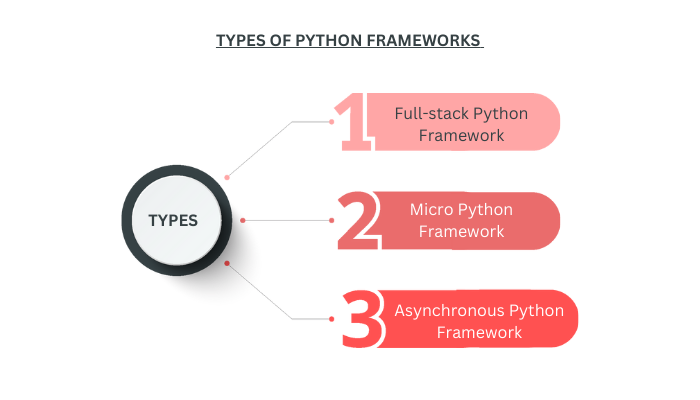
Full-stack Python Framework
A full stack framework or what we call full stack Python web development framework have all a web developer need. Covering everything from form generators and template layouts to form validation.
Micro Python Framework
As opposed to the previous ones, micro Python frameworks would require a little manual work. They automate a lot of repeating processes but not everything. Therefore, these types of Python web frameworks are used in minimalistic web application development.
Asynchronous Python Framework
Lastly, we have asynchronous frameworks. These types of Python frameworks use the asyncio library and run numerous processes at the same time. Consequently, they can handle a large number of connections.
These are the different types of Python frameworks. And with this out of the way, it’s tied to discussing the benefit of using Python frameworks.
The benefit of Using Python Frameworks
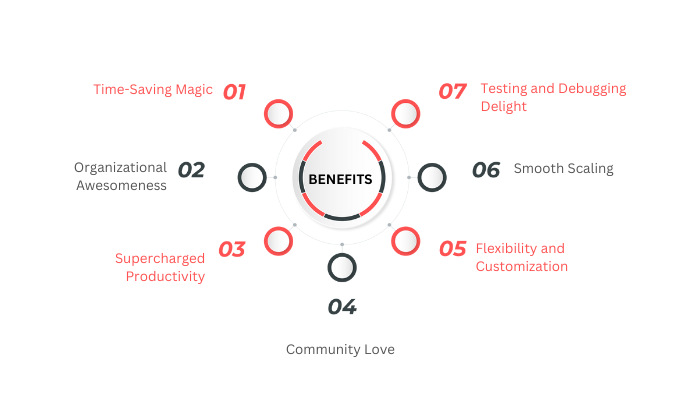
Why should you use Python frameworks in web development or any other project? Well, there are a range of reasons and benefits to doing so. And in this section of the blog, we shall be discussing exactly that.
Time-Saving Magic
Python frameworks provide pre-built modules and libraries that save you precious time.
Instead of reinventing the wheel and writing code from scratch, you can leverage these ready-made components to speed up development.
This means you can focus on the unique aspects of your application and deliver results faster.
Organizational Awesomeness
Frameworks like Django follow the model-view-controller (MVC) pattern, which helps you organize your code in a logical and structured manner.
Moreover, this separation of concerns makes your codebase more maintainable and scalable. It also promotes code reuse, reducing redundancy and making your life easier.
Supercharged Productivity
Python frameworks offer a wealth of built-in functionalities, such as authentication, routing, database management, and form handling.
With these features readily available, you can build applications more efficiently. You don’t have to spend time reinventing common functionalities, allowing you to focus on the unique aspects of your project.
Community Love
The Python community is vibrant, supportive, and constantly evolving.
Python Frameworks like Flask and Django have large communities that actively contribute to their development and maintenance.
This means you can tap into a wealth of resources, tutorials, and extensions created by other developers.
You’ll never feel alone on your coding journey! This is one of the leading reasons why clients hire Python developers.
Flexibility and Customization
Python frameworks offer a balance between structure and flexibility.
They provide a solid foundation while allowing you to customize and extend functionalities as per your project’s requirements.
You can add or remove components based on your needs, ensuring that the framework adapts to your unique use case.
Smooth Scaling
As your application grows, Python frameworks can handle the increased complexity and traffic.
Frameworks like Tornado and FastAPI are specifically designed for high-performance and high-concurrency scenarios.
They are built to handle thousands of simultaneous connections, ensuring your application can scale smoothly as demand increases.
Testing and Debugging Delight
Many Python frameworks provide excellent support for testing and debugging.
They offer built-in tools and libraries that make it easier to write tests and ensure the stability and quality of your code.
Furthermore, this helps catch bugs early in the development process and ensures a more reliable and robust application.
Best Python Frameworks
It’s about time to discuss the best Python frameworks that you can use in our next project.
Here, we shall be going through some of the top picks when it comes to frameworks. So, without further ado, let’s get right into it:
1. Django – Most Popular Python Web Development Framework

Django is often referred to as the “web framework for perfectionists with deadlines.” It’s powerful, reliable, and widely used for developing robust web applications.
Moreover, it follows the model-view-controller (MVC) architectural pattern, making it easy to organize your code, making it one of the best app development frameworks.
It also has a built-in admin interface, making it a breeze to manage your application’s data.
- Full-featured framework for building web applications
- Follows the MVC architectural pattern
- Built-in admin interface for easy management of application data
- ORM (Object-Relational Mapping) for database abstraction
- URL routing and request handling
- Template engine for flexible and reusable UI components
2. Flask – Python Web App Framework
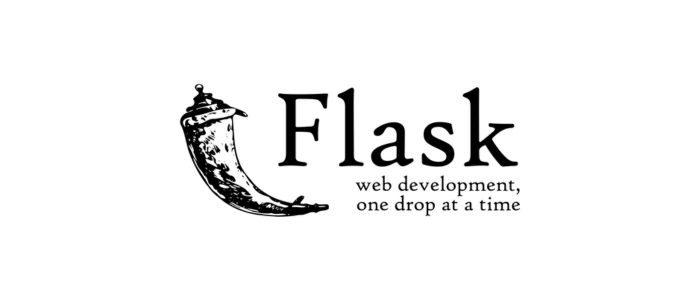
Flask is a lightweight and flexible framework that’s perfect for building smaller web applications or APIs. It’s known for its simplicity and ease of use, making it a great choice for beginners.
In addition to this, it follows a minimalistic approach, allowing you to choose the components you need while keeping the core framework small and efficient. It’s highly customizable and has an active community, which means plenty of extensions and resources are available.
- Lightweight and flexible framework
- Minimalistic approach with the ability to customize components
- Easy to get started with and learn
- Great for building smaller web applications or APIs
- Extensive ecosystem of extensions is available
- Built-in development server for quick testing and debugging
3. Pyramid – Another Python Framework For Web Apps

Pyramid is a versatile framework that strikes a balance between simplicity and power. It provides a solid foundation for building complex web applications while remaining flexible enough to adapt to your specific needs.
Furthermore, as one of the leading Python frameworks it follows a “pay only for what you need” philosophy, allowing you to add functionality as required. It’s well-documented and has excellent support for testing and debugging.
- Versatile framework suitable for both simple and complex web applications
- Follows a “pay only for what you need” philosophy
- Highly customizable and adaptable to specific project requirements
- Excellent support for testing and debugging
- Well-documented with a focus on maintainability and scalability
- Supports a variety of templating engines and authentication methods
4. FastAPI – Python API Framework
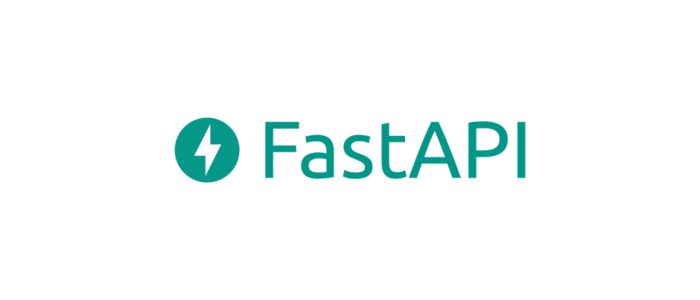
FastAPI is a modern, high-performance framework designed for building APIs. It leverages Python-type hints to provide auto-generated, highly efficient code.
This Python API framework is known for its incredible speed and scalability, making it an excellent choice for projects that require real-time processing or high throughput.
- Modern, high-performance framework for building APIs
- Leverages Python-type hints for auto-generated, efficient code
- Incredible speed and scalability
- Asynchronous programming support for improved performance
- Easy integration with existing Python libraries and frameworks
- Interactive API documentation with automatic validation
5. Tornado – Python Asynchronous Framework
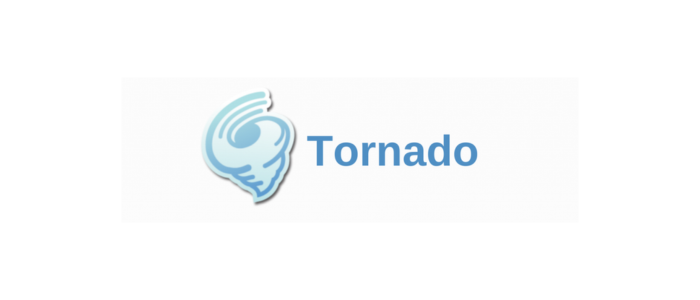
Tornado is a powerful asynchronous framework that excels in handling high-concurrency applications, such as real-time web applications and WebSockets.
It’s lightweight and has excellent performance, making it a popular choice for building scalable and responsive applications.
Tornado’s event-driven architecture allows it to handle thousands of simultaneous connections efficiently.
- Asynchronous framework designed for high-concurrency applications
- Ideal for building real-time web applications and WebSockets
- Lightweight with excellent performance
- Event-driven architecture for handling thousands of simultaneous connections
- Built-in support for non-blocking I/O operations
- Easy integration with existing Python libraries and frameworks
6. CherryPy – A Minimalist Python Framework
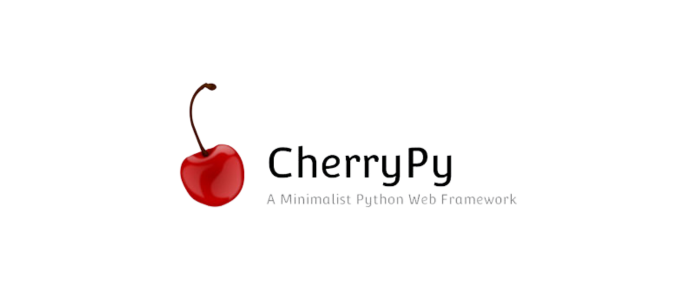
CherryPy is a minimalist framework that focuses on simplicity and ease of use. It provides a straightforward and intuitive way to build web applications.
Also, the platform is known for its clean and readable code, making it an excellent choice for developers who prefer a less complex framework. And despite its simplicity, it offers features like URL mapping, session handling, and caching.
- Minimalist framework focusing on simplicity and ease of use
- Clean and readable codebase
- URL mapping and request handling
- Session handling and caching support
- Suitable for smaller projects or developers preferring a less complex framework
- Easy to deploy and extend
7. Bottle – Lightweight Python Framework

If you’re looking for an ultra-lightweight framework, Bottle is worth considering. It’s a micro-framework that fits in a single file and has no external dependencies, making it incredibly easy to set up and deploy.
Despite its size, Bottle still packs a punch, providing routing, templating, and other essential features. It’s great for small projects or APIs that don’t require the full weight of larger frameworks.
- Ultra-lightweight micro-framework
- Fits in a single file with no external dependencies
- Easy to set up and deploy
- Provides essential features like routing and templating
- Suitable for small projects or building lightweight APIs
- Minimalistic approach with straightforward syntax
So, these are some of the best Python frameworks.
Conclusion
Do you want to hire Python developers? Well, you better make sure they are familiar with Python frameworks. Now, we discussed all you need to know about Python frameworks in this blog. And with this, it’s time to conclude.
FAQ
Python frameworks are pre-built software libraries that provide a structure and set of tools for developing web applications or software projects in Python.
Popular Python frameworks include Django, Flask, and Pyramid. Django is ideal for complex applications, Flask is lightweight and flexible, while Pyramid offers a balanced approach.
Django is a high-level Python framework used for building robust web applications quickly. It follows the Model-View-Controller (MVC) architectural pattern and includes built-in features for database access, authentication, and more.
Flask is suitable for small to medium-sized projects that require flexibility. It is a microframework that allows you to add only the components you need, making it great for simple web applications or APIs.
Pyramid is a Python web framework known for its flexibility and scalability. It provides a solid foundation for building both small and large applications and follows the principles of “URL dispatch” and “configuration over convention.”
While Python frameworks are commonly used for web development, they can also be used for other purposes, such as building command-line tools, scientific computing applications, or even desktop GUI applications.
It is possible to use multiple frameworks in a single project, although it may introduce complexity. However, it is more common to choose one framework that best fits your project’s requirements and stick with it.
Yes, Python frameworks like Django and Flask have excellent documentation and vibrant communities, making them beginner-friendly. They provide helpful abstractions and simplify common tasks, easing the learning curve for newcomers.
Yes, Python frameworks can scale well depending on how they are used. Techniques like caching, load balancing, and optimizing database queries can enhance the scalability of applications built with Python frameworks.
Yes, there are alternative frameworks for web development in other languages, such as Ruby on Rails (Ruby), Laravel (PHP), and Express.js (JavaScript/Node.js). The choice depends on your language preferences and project requirements.

Niketan Sharma is the CTO of Nimble AppGenie, a prominent website and mobile app development company in the USA that is delivering excellence with a commitment to boosting business growth & maximizing customer satisfaction. He is a highly motivated individual who helps SMEs and startups grow in this dynamic market with the latest technology and innovation.
Table of Contents




No Comments
Comments are closed.